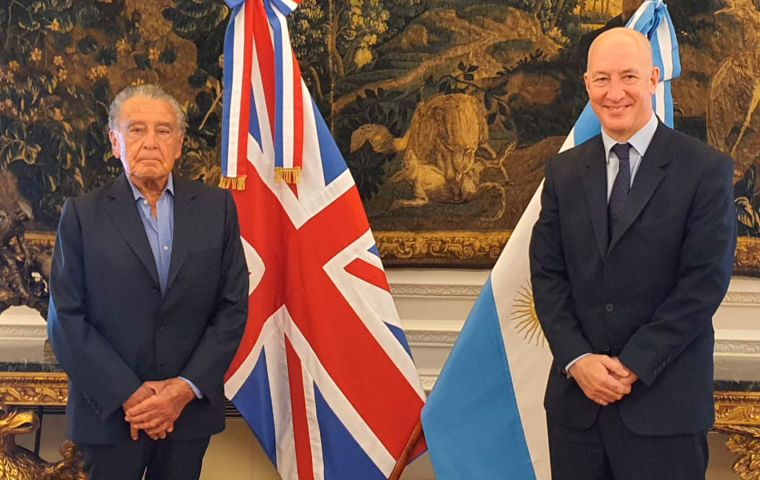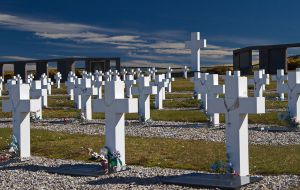MercoPress. South Atlantic News Agency
OBE awarded to Argentine businessman Eurnekian for his involvement in building of 1982 war cemetery
 Few Argentines have received the OBE, Borges being one of them.
Few Argentines have received the OBE, Borges being one of them. In what was probably his last public appearance, British Ambassador to Buenos Aires Mark Kent Friday bestowed – on behalf of Queen Elizabeth II – the Medal of Officer of the Order of the British Empire (OBE) on Argentine businessman Eduardo Eurnekian for his services to the relations between the two countries. cemetery
Ambassador Kent is leaving his post this coming Wednesday after five years during which he succeeded at building bridges between the two nations. But he was not alone: “Without you, Eduardo, the relationship between England and Argentina would not have been the same,” he said as he pinned the medal on the businessman who made the scars of the Falklands/Malvinas 1982 his own problem and funded the building of a cemetery in Darwin for Argentine fallen combatants as well as providing for humanitarian actions of various kinds, including trips by the relatives to be close to their dear ones, particularly at times when the Argentine government looked the other way in what was known as the “desalinization” of the country, which basically consisted of pretending the 1982 conflict had never happened.
Eurnekian's father was an Armenian immigrant, a community that remained united in its diaspora around the world after the genocide carried out by Turkey at the beginning of the last century. Around 80,000 Armenians live in Argentina. Most of them arrived at the beginning of the last century, being the third largest community of Armenians in the world. True to the tradition of solidarity with his homeland and his people, Eurnekian became the largest foreign investor in the current Republic of Armenia including also the airport of its capital Yerevan.
Until the possibility of building the Argentine cemetery in the Falkland Islands came into his life, Eduardo Eurnekian always thought he wanted to be buried in Armenia with his relatives. But one day when visiting the Argentine cemetery on East Falkland he saw an empty. He asked what had happened and he was told the remains of that soldier had been flown back to his home town. “In that empty tomb, I want to be buried,” Eurnekian said.
“I still have in my mind the previous steps that led me to participate in the ‘Darwin Cemetery Project,’ in memory of the Argentine soldiers who fell on the islands. It was on July 14, 1999, the date that Foreign Ministers Di Tella and Cook signed the joint resolution that delegated responsibility for the maintenance and care of the military cemetery to the families of those killed in the islands. Subsequently, I received the call from Sir Robin Christopher, ambassador of the United Kingdom at the time … summoning me for the construction of the new funerary monument, and finally, on September 13, 2016, the Foradori-Duncan resolution, gave rise to the identification of the bodies buried in said Darwin cemetery.”
“In this context, it was a privilege for me to be a vehicle of comfort, in the midst of so much mourning and pain. These gestures, added to the moving reunions carried out by soldiers from both countries, are proof that peace is good, a virtue, a dynamic and constructive process that requires continuous care for the causes that disturb it. We have ample evidence of the global relationship we live in, and the processes that foster it: humanitarian assistance, as well as the exchange of goods, services, information, science and technology.”
Eurnekian said he now viewed the Darwin Cemetery stands as a ‘Monument to Peace’ and stressed that “those who appreciate life, know that rights and differences can be defended and settled in civilized, human terms without resignation, but avoiding barbarism.”
Eurnekian closed his speech by recalling a by Borges, Juan López and John Ward, which depicts the possible links between combatant on each side: They would have been friends, but they only met face to face once, on too famous islands, and each one of them was Cain, and each one, Abel. They were buried together. Snow and corruption know them. The fact that I refer to happened in a time that we cannot understand.
Few Argentines have received the OBE, Borges being one of them.
Ambassador Kent also underlined “the courage and diplomatic contribution” of Eurnekian, of whom he stressed that throughout the realization of the trips he always kept a low profile and allowed the protagonists to be the families of the fallen.
In 2004 Eurnekian had the cenotaph erected with the 649 names of those who fell during the war. He refurbished the old cemetery that had been built under the supervision of the Commonwealth War Commission after British Colonel Geoffrey Cardozo collected the bodies of the soldiers from the battlefields. And he turned those simple graves into a great monument to honour the combatants.





Top Comments
Disclaimer & comment rules-

-

-

Read all commentsHe doesn't even know the name of his own cemetery! Its the Argentine Military Cemetery and it is not in Darwin. Darwin Cemetery is something else entirely. And as for being given an OBE? A downright insult.
Jun 28th, 2021 - 11:16 am +5I'm told that the Argentine Military Cemetery is at Fish Creek, not Darwin which has its own cemetery. Long overdue for all the residents to be returned to Argentina as the current arrangement only acts as a propaganda site for visiting Argies.
Jun 28th, 2021 - 11:39 am +5An OBE for Eduardo Eurnekian is madness. Kent proved far too damned soft with the Argies. Too much of a populist. It is to be hoped that Kent's successor is less naive.
Huge propaganda stunt .an insult to islanders who continue to suffer the Argentine harassment.
Jun 28th, 2021 - 10:33 am +3Looks like Britain supports that Argentine ideal.
Even says that he wants to be buried in the war grave. I dont think so.
Commenting for this story is now closed.
If you have a Facebook account, become a fan and comment on our Facebook Page!